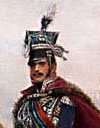 |
| Michel Ney, Bravest of the Brave |
Similarly, the choice of generals to command the two wings left much to be desired. Marshal Ney, "the bravest of the brave," was only given command of the left wing on the afternoon of the 15th -- a totally unsuitable appointment for a soldier who could still be relied upon for courage and elan in action, but whose brain was no longer capable of cool strategic calculations required of a semi-independent commander. The Emperor should have been well aware of Ney's limitations. As early as 1808, he had likened the marshal's comprehension of Napoleonic strategy to that of "the last joined drummer boy"; and although in 1812 "the bravest of the brave" had earned the highest imperial accolade for his conduct during the retreat from Moscow, Michael Ney had never managed to throw off completely the state of "battle fatigue" engendered by the horrors and privations of that campaign. Nor had he ever filled the gap on his staff caused by the defection of Baron Jomini. His showing at Bautzen in 1813 had fully demonstrated his limitations.
Nevertheless, Napoleon's decision to appoint Ney to high command in 1815 was an act of considerable cunning. Not only was Ney the hero of the French army, he was also an invaluable figure of propaganda for use against the Bourbon cause. On the one hand it was a calculated blow against King Louis XVIII's prestige to re-employ the former Bourbon commander in chief; on the other, Ney's preferment might serve to persuade other servants of the Bourbons that their acts of desertion in 1814 could be overlooked in return for new tokens of devoted service to Napoleon's cause. Thus on political grounds there was quite a lot to recommend Ney's appointment in 1815, but there can equally be no doubt that he proved a decided military liability in the days that lay ahead. In any case the late timing of his arrival at the front to take up his appointment made it impossible for him to get to know his officers and men before leading them into action -- a fatal disadvantage.
~ D. Chandler, The Campaigns of Napoleon, p. 1022




















































2 comments:
I like that photo, though it looks like a young Ney. I imagine that after Russia his face would have been a lot more weatherbeaten.
Chandler's points are valid, though John Elting argues in his chapter on the 100 Days (Swords Around a Throne) that Napoleon did not have a deep bench of generals and marshals by 1815 and didn't have much time to put an army and command team together. However, Ney wasn't up to unsupervised leadership in the middle of the day of Waterloo, but a younger and healthier Napoleon wouldn't have let let Ney play alone.
Cheers,
Michael
Great extract. I enjoyed it.
Post a Comment